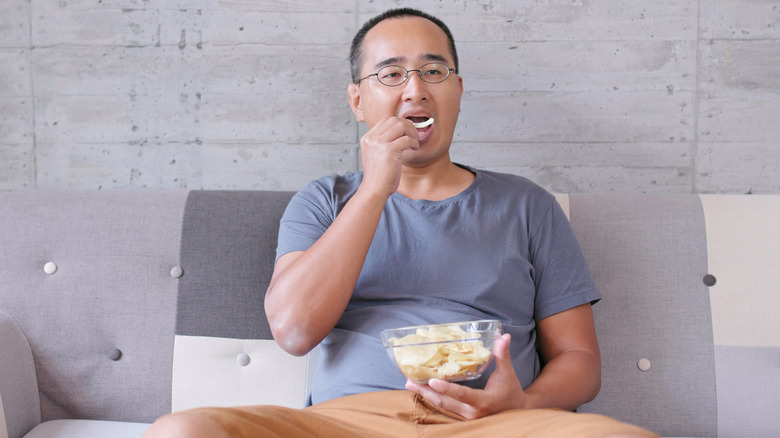What Happens To Your Prostate When You Eat Too Much Salt
It's no secret that the food on our plates can sometimes lead to an unpleasant bathroom experience later on. This is particularly true when it comes to salt intake for people with benign prostatic hyperplasia (BPH), otherwise known as an enlarged prostate gland. According to experts at the Midwest Institute for Non-Surgical Therapy, eating too much salt may exacerbate urinary symptoms associated with the condition.
Some ways in which BPH manifests are in the form of a weak urine stream, urinary urgency, after-dribble, and repeatedly waking up to pee in the middle of the night. In fact, the National Institute of Diabetes and Digestive and Kidney Diseases (NIDDK) reports that individuals with an enlarged prostate may pee upwards of eight times daily.
To help manage lower urinary tract symptoms (LUTS), experts suggest keeping one's salt intake to a minimum. Otherwise, here's how a high-salt diet can affect the prostate.
How salt can aggravate symptoms of an enlarged prostate
Researchers explored the mechanisms behind the relationship between salt intake and BPH in a 2023 rodent study published in BMC Urology. They induced BPH by administering testosterone injections in castrated adult rats that had been placed on either a salt-free, low-salt, standard-salt, or high-salt diet. The study findings showed that any degree of salt intake was associated with aggravation of BPH. Regardless of whether the rodents consumed low, standard, or high amounts of salt, the researchers saw that salt intake increased inflammation and oxidative stress and impacted the natural cycle of cell death and new blood vessel formation in prostate tissue.
That being said, it's not always possible to completely avoid any and all salty foods. Yet experts note that improvements can still be achieved by reducing one's intake. The Midwest Institute for Non-Surgical Therapy explains that eating less salt may minimize fluid retention (swelling due to an accumulation of fluid in the tissues). As a result, this relieves added pressure placed on the bladder and can help alleviate LUTS in people with an enlarged prostate.
Foods that may help minimize BPH symptoms
Along with salty foods, acidic food items and spicy foods can also cause urinary discomfort for people with an enlarged prostate, according to the Midwest Institute for Non-Surgical Therapy. The same is true for dairy, sugar, processed meat, caffeine, and alcohol. If this feels like a miserably long list of things to avoid, know there are still plenty of foods that people with BPH can enjoy that their prostate will thank them for.
Fatty fish, avocados, nuts, seeds, turmeric, dark leafy greens, quinoa, watermelon, and apples are just a few of the many foods that may help keep symptoms of an enlarged prostate in check. This reinforces research from a 2021 scientific review published in the journal Nutrients, which looked at the effects of diet on erectile dysfunction (ED) and BPH. The researchers determined that the Mediterranean diet — which focuses on the consumption of fruits, veggies, nuts, and fish along with a lower intake of red meat — may benefit people with erectile dysfunction and BPH by helping regulate prostate growth.


